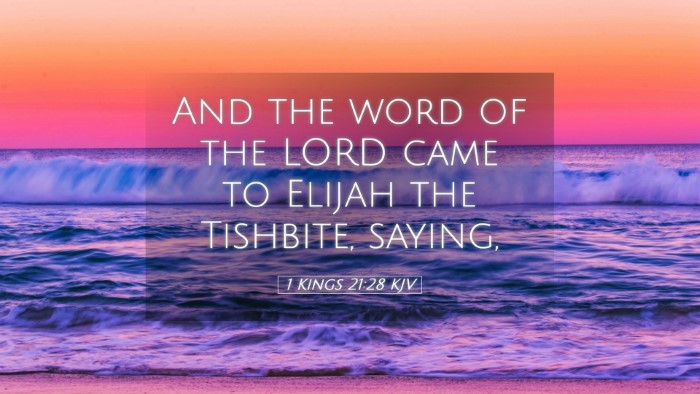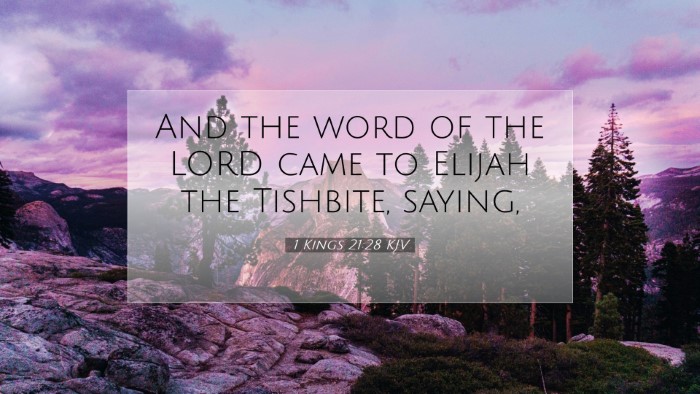Commentary on 1 Kings 21:28
Text of 1 Kings 21:28: "And the word of the LORD came to Elijah the Tishbite, saying,"
Introduction
This passage within the narrative of 1 Kings brings forth a striking message from God through the prophet Elijah. It follows a grievous episode in biblical history involving King Ahab, Jezebel, and Naboth’s vineyard. These events highlight themes of injustice, divine retribution, and the persistent voice of God. This commentary integrates insights from notable public domain theologians including Matthew Henry, Albert Barnes, and Adam Clarke.
Contextual Background
1 Kings 21 presents a critical view of King Ahab's reign over Israel, particularly focusing on his covetous nature and moral failings. The account showcases the confrontation between divine will and human desire, emphasizing how Ahab and Jezebel conspired to unjustly acquire Naboth’s vineyard. The narrative not only serves as a moral lesson but also illustrates God's justice and the role of His prophets.
Theological Insights
- The Leadership of Elijah: Elijah’s role as a prophet is central to understanding this verse. According to Matthew Henry, Elijah symbolizes God’s persistent call for accountability among His people, particularly leaders. Elijah’s coming word signifies a divine intervention in the face of rampant injustice.
- Divine Revelation: Albert Barnes highlights that the phrase "the word of the LORD came to Elijah" demonstrates God's direct communication with His prophets. This underscores the idea that God does not remain passive in the face of wickedness; rather, He actively engages and commissions His messengers.
- Message of Justice: Adam Clarke emphasizes that God’s word to Elijah is a vital declaration concerning the divine judgment awaiting Ahab and Jezebel for their actions against Naboth. The prophetic word acts as a precursor to the impending retribution, signalizing both warning and resolution.
Moral and Ethical Implications
The events leading up to 1 Kings 21:28 reflect deep moral and ethical questions that resonate today. The behavior of Ahab and Jezebel provides a grim example of the lengths to which individuals may go to fulfill their desires, leading to grave injustices.
The urgency of God's message through Elijah serves as a reminder of the accountability that leaders hold, particularly in their treatment of the vulnerable. It calls into question the integrity of power and serves as a warning against complacency in the face of evil.
God's Sovereignty and Providence
This verse accentuates God’s sovereignty over human affairs. Despite the apparent success of Ahab and Jezebel’s plots against Naboth, the divine plan continues to unfold. Matthew Henry points to the assurance that even when human authority misuses its power, God's righteousness prevails in history.
Moreover, Albert Barnes states that God's providence ensures that justice is served in due time. The passage as a whole provides assurance to the faithful that God sees and addresses the injustices of the world, even when they seem to be temporarily overlooked.
The Role of Prophets
Elijah's prophetic ministry exemplifies the crucial role of prophets in biblical history. Adam Clarke explains that the prophets serve as intermediaries between God and humanity, often delivering difficult and challenging messages. The power inherent in Elijah's call to confront Ahab reiterates the significance of prophetic voices who challenge social injustices.
The message to Elijah is not merely one of condemnation but also an invitation to speak truth to power, revealing the divine urgency for justice and moral integrity among leaders. This role remains relevant for modern-day prophets and leaders within the church and society.
Conclusion
1 Kings 21:28 expresses a profound and multifaceted message concerning divine justice, prophetic authority, and moral accountability. As this commentary amalgamates insights from Henry, Barnes, and Clarke, it illuminates the timeless truth that God’s voice will always rise against oppression and injustice.
Pastors, theologians, and students of Scripture are encouraged to reflect on the implications of this passage, considering their own roles within the context of moral leadership and the advocacy for justice, just as Elijah was commanded to enter into action by divine invitation.


